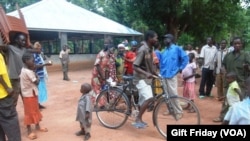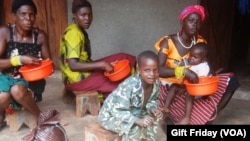YAMBIO, SOUTH SUDAN —
In the South Sudanese state of Western Equatoria where HIV-prevalence is well above the national and even the regional average, HIV/AIDS sufferers are fighting the virus through a support group that goes out into the community to spread a message of safe sex.
And it's working.
Forty-year-old Angelina Baptist, who was diagnosed with HIV seven years ago, said the Zereda AIDS Information Center group in Yambio has been key to helping her live with the virus.
"When I got the disease, I was very worried, but when I started getting counseling-- before I thought I had no life in this world. But after joining the group I realized am still useful in this world," she said.
Nearly seven percent of residents of Western Equatoria have HIV, the virus that causes AIDS. That's more than double the national average of 2.6 percent, and around two percentage points higher than the rate of HIV-infection in Sub-Saharan Africa as a whole, the region worst hit by the epidemic.
Zereda, which has grown to 470 members, encourages its members to go out into the community to encourage people not to engage in risky behavior and tell them to get tested so that they know their HIV status.
Dozens of community members have responded to their appeal and gotten tested, Baptist said.
But more programs like Zereda are needed if Western Equatoria is to get more people on treatment and if the spread of the disease is to be stopped, said the state's HIV/AIDS Director Timateo Bandas.
Counseling and testing centers have been set up in all 10 counties of Western Equatoria and anti-retroviral drugs are available for all 8,000 patients in the state who have been diagnosed with HIV, said Bandas.
But some use the fact that there are effective treatments that allow people to live with HIV as an excuse to engage in risky behavior, Bandas said.
"With the presence of drugs, people are reckless: they say, 'There are drugs, even if I get infected I will still get my drugs.' People need to work hard as to change behavior," he said.
Community-based support groups are the best way to get people to change their behavior or to be tested to determine if they are HIV-positive, said Bandas.
But the only such group that is active is Zereda. There is no money to get other groups off the ground at the moment, Bandas said.
Joseph Gabriel, who is HIV-positive, urged officials to find hte money to set up new support groups. He and his wife, who is also HIV-positive, only got tested and started accessing treatment after they found out about Zereda.
"Before I was tested, I was sick all the time," Gabriel said.
"My body was in pain, so much malaria, headaches. But I started taking my drugs, and now I feel OK. My wife also has this virus. She was tested in 2008. As now she is also well.”
Members of Zereda convinced Gabriel to get tested and start taking anti-HIV medications. He now works through Zereda to get other members of his community to get tested.
And it's working.
Forty-year-old Angelina Baptist, who was diagnosed with HIV seven years ago, said the Zereda AIDS Information Center group in Yambio has been key to helping her live with the virus.
"When I got the disease, I was very worried, but when I started getting counseling-- before I thought I had no life in this world. But after joining the group I realized am still useful in this world," she said.
Nearly seven percent of residents of Western Equatoria have HIV, the virus that causes AIDS. That's more than double the national average of 2.6 percent, and around two percentage points higher than the rate of HIV-infection in Sub-Saharan Africa as a whole, the region worst hit by the epidemic.
Zereda, which has grown to 470 members, encourages its members to go out into the community to encourage people not to engage in risky behavior and tell them to get tested so that they know their HIV status.
Dozens of community members have responded to their appeal and gotten tested, Baptist said.
But more programs like Zereda are needed if Western Equatoria is to get more people on treatment and if the spread of the disease is to be stopped, said the state's HIV/AIDS Director Timateo Bandas.
Counseling and testing centers have been set up in all 10 counties of Western Equatoria and anti-retroviral drugs are available for all 8,000 patients in the state who have been diagnosed with HIV, said Bandas.
But some use the fact that there are effective treatments that allow people to live with HIV as an excuse to engage in risky behavior, Bandas said.
"With the presence of drugs, people are reckless: they say, 'There are drugs, even if I get infected I will still get my drugs.' People need to work hard as to change behavior," he said.
Community-based support groups are the best way to get people to change their behavior or to be tested to determine if they are HIV-positive, said Bandas.
But the only such group that is active is Zereda. There is no money to get other groups off the ground at the moment, Bandas said.
Joseph Gabriel, who is HIV-positive, urged officials to find hte money to set up new support groups. He and his wife, who is also HIV-positive, only got tested and started accessing treatment after they found out about Zereda.
"Before I was tested, I was sick all the time," Gabriel said.
"My body was in pain, so much malaria, headaches. But I started taking my drugs, and now I feel OK. My wife also has this virus. She was tested in 2008. As now she is also well.”
Members of Zereda convinced Gabriel to get tested and start taking anti-HIV medications. He now works through Zereda to get other members of his community to get tested.





